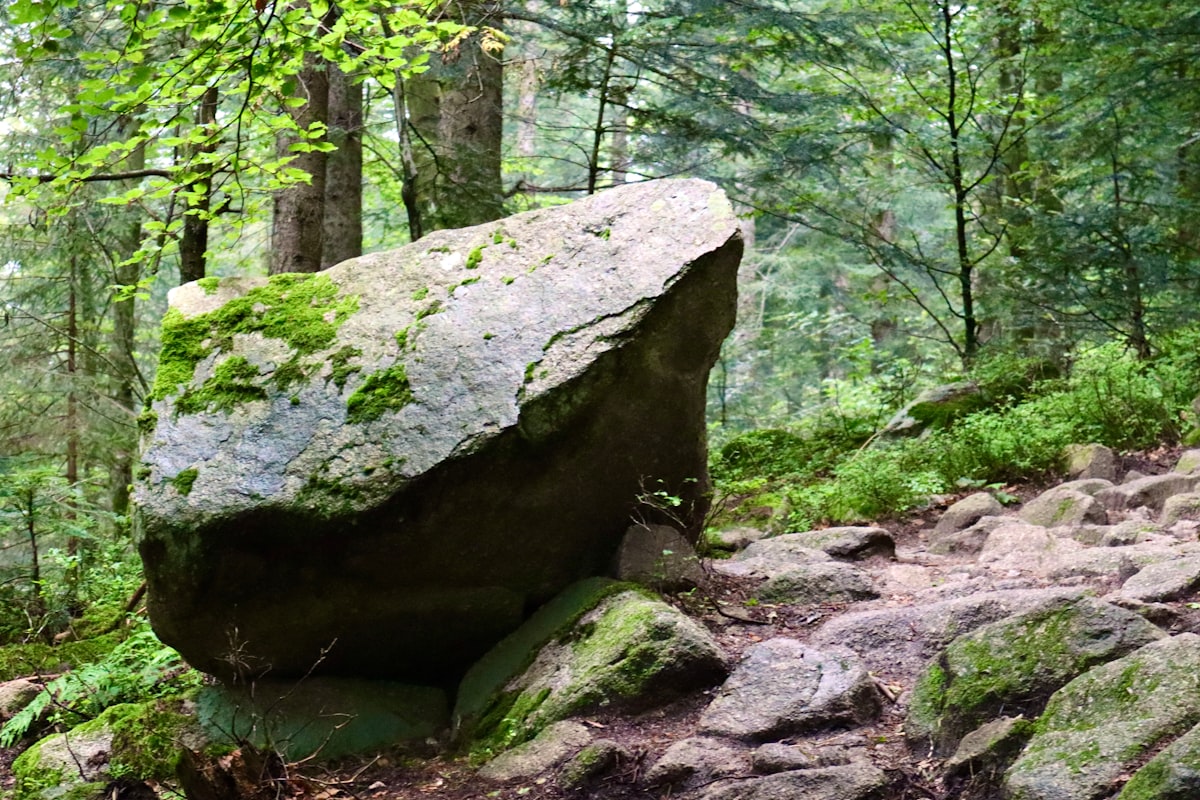A Moveable Rock
The story of Constance, the rock that chose not to move.

As we know, most rocks don't move.
I say most because a species does move and lives deep in the northern forests of Canada.
They've migrated across the Canadian Shield for longer than any living creature walked across the land.
You'd never know if you saw one because they move so slowly.
You may stumble across one deep in the woods, sitting by a tree blanketed in moss and mushrooms. You'd only know the following year because it would be on the other side of the tree—if you'd even notice or remember.
Some travel towards their family upended by glaciers, while others only sightsee or head to the Rockies for work.
Sadly, this is the story of Constance, the rock that chose never to move.
She landed in her home off the Laurentide Ice Sheet, settling in the Boreal forests by the North Saskatchewan River.
Constance loved her place in the woods, surrounded by tamarack, spruce, pine, and fir trees. She'd spend years gazing at the stars, tracking animals as they grazed, and hibernating beneath the deep winter snow. She'd spent hundreds of years here and planned to spend thousands more.
Sometimes she grew lonely. The rocks that had arrived here eventually set out on their journeys to discover the world. They'd invite her along, but she'd always pass on their offers, content with the world as it was.
But the world didn't stop changing. Fires raged and scoured the land, and men intruded, blocking the nearby river and flooding the valley. As each year passed, the currents swept away the sandy banks, and the water grew closer and closer.
During this time, other rocks would travel through, and Constance would be happy for their company. She'd show them her favourite constellations, introduce them to the local wildlife, and let them stay close on cold winter nights.
But eventually, they'd grow restless and want to continue their journey. They'd invite her to join them, cautioning her that the waters continued to grow closer to her home. She'd always say no, thankful for the invite but not wanting to leave her home.
After several snowy winters and soaked springs, the banks of the river washed right up underneath Constance. She teetered on the edge but was confident the waters wouldn't continue to flow swiftly another year and refused to move.
Unfortunately, she was wrong. After another wet spring, she tumbled over the edge and rolled deep below the waters.
Even then, she refused to move. Now at the bottom of the lake, she saw new creatures like rainbow trout and skittering crayfish. And she could still watch her stars and northern lights until the water froze over in the winter.
And so she stayed there a hundred years. Other rocks no longer visited her here, travelling along the river shores, unaware she was deep beneath the waters. She grew lonely but had accepted the life she'd decided, uncertain of anything beyond her forest, and chose to stay.
And the gentle currents and waves washed over her through the years, slowly scraping and scrubbing her surface. Little by little, without her even noticing, they wore her down and buried her deep beneath the sandy bottom.
Now she could no longer see her stars or visit the creatures of the water, and although she could free herself, she felt too small and weak to do so. And so she stayed, at the bottom of the river, until she wore down to a tiny grain of sand.
I want to tell you that after a snowy winter and a wet spring, the river currents rushed down from the mountains, and Constance was lifted and rushed downstream. I want to tell you she saw unfamiliar sights—new trees, new creatures, and all the creations made by men. I want to tell you she wasn't alone.
But I can't.
Constance chose to stay, never changing, in a world full of change, and to this day, she remains alone, buried beneath the sand at the bottom of a dark, deep river.
She's not the only rock of her species. Many live and move through the northern forests of Canada. They don't stay put, but continue to change, grow, and discover the world. And If you look closely enough, maybe you'll discover one.
